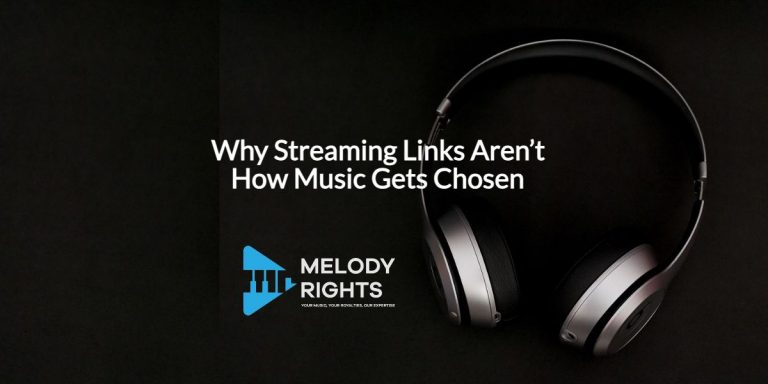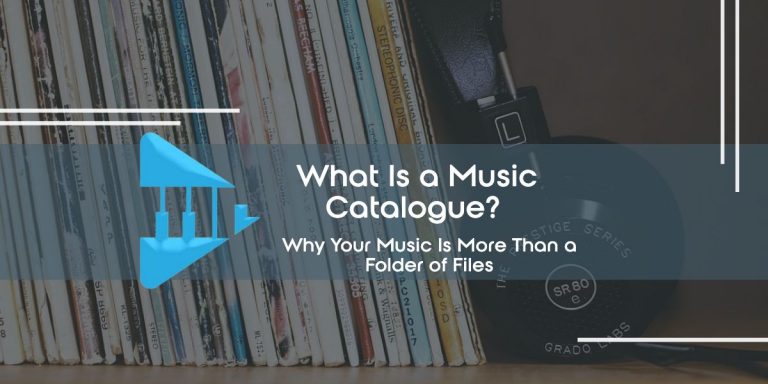Table of Contents
ToggleTL;DR: Key Summary
You want your music protected and ready for anything. That means more than just copyright. Get your details right, lock in your rights, and set yourself up for sync and royalties worldwide. Watch out for scams, keep your paperwork tight, and use modern tools to stay one step ahead.
- Register your work officially, not just with a timestamp.
- Fill in your metadata everywhere your music lives.
- Prep for sync from day one and stay organized.
- Use only trusted rights partners.
How to Protect Your Music: The Moment Every Artist Faces
You finish a new track at some stupid hour. Coffee’s cold, your DAW (digital audio workstation) is still open, and there’s that weird moment where you realize, now what? Do you email it to yourself, upload it, hope no one jacks it? How do you protect your music, not just from thieves, but from getting lost in the noise or stuck in legal limbo?
If you’re an indie artist, producer, or anyone not already on a label’s payroll, this isn’t a hypothetical. It’s the fear that keeps you up, and the reason so many great songs disappear before they ever earn a cent.
Why Protecting Your Music Feels Impossible
“Just copyright your song” sounds simple, but it’s not enough. Different countries, platforms, and agencies all use their own systems. If your details are missing or out of sync, your money can disappear.
Millions in royalties go missing each year. In the UK, PRS for Music has kept hold of money from more than 100,000 live shows because setlists and song credits were never sent in. That money sits in a pot called the “black box,” waiting for someone to claim it (The Guardian).
Globally, creators earned a record €13.1 billion in royalties in 2023, according to CISAC (CISAC). Even so, a lot of artists never see their share because their songs aren’t registered in the right places or their information isn’t complete.
The real problem isn’t just ownership on paper. If you aren’t tracking every play and keeping your credits and registrations accurate, you can end up leaving real money on the table. Every single year.
What Protecting Your Music Really Means
Metadata is the key that unlocks your music’s value. Song titles, writer credits, splits, and codes like ISRC are what help money and credit find you. If those details are missing, someone else could get paid for your work, or your track might be ignored by the entire royalty system. Learn more about sync and metadata here.
When you’re protecting your music, here’s what really matters:
- Copyright registration: This proves you own your song. Without it, it’s much harder to fight theft.
- Collection societies: Joining a PRO like PRS, BMI, or ASCAP, along with global rights groups, helps you collect every type of royalty you’re owed. Here’s how to register your music with the right organizations.
- Sync and versions: Music supervisors look for instrumentals, clean edits, and full credits. If you don’t prep your tracks for sync, you’re less likely to get placed. See how to submit your music for film and TV placements.
- Anti-piracy and tracking: Using tools like Content ID, watermarking, and modern tracking tech helps you catch leaks or AI copies before they spread.
- Admin and contracts: Save your split sheets, agreements, and key emails. Solid paperwork is your backup if there’s ever a dispute over ownership or credits.
Skip any of these steps and you might end up watching your hard work get lost, miscredited, or simply unpaid. Protecting your music is about more than just legal ownership. It’s about giving your tracks every chance to earn for you, wherever they go.
Step-by-Step: How to Protect Your Music and Get Paid
1. Get Your Metadata Straight
Your credits, splits, titles, and codes matter more than most people think. This info is what allows money to find you. Double-check your metadata before you upload, and fix mistakes before they spread.
2. Register Your Copyright Officially
Go straight to your country’s copyright office and register every song. Skip the shortcuts. Official paperwork is what lets you prove ownership if you ever need to.
3. Sign Up with PROs and Global Rights Organizations
Performance rights organizations like PRS, BMI, or ASCAP help you get paid for plays and performances. For global coverage, join groups like PPL (UK) or SoundExchange (US) that collect for international use. How to register your music with the right organizations.
4. Register with The MLC (US Artists)
If you release music in the United States, register with The Mechanical Licensing Collective (themlc.com). This covers streaming mechanical royalties, something many indies miss.
5. Prep Your Tracks for Sync
Have instrumentals, clean edits, and clearly labeled files ready for every release. Music supervisors want choices, and the more organized you are, the easier it is to get placed. See how to submit your music for film and TV placements.

6. Use Anti-Piracy and Tracking Tools
Protect your tracks with Content ID, watermarking, and platforms that track usage across the web. These tools help you spot leaks, catch AI-generated copies, and act fast if your music is used without your okay.
7. Keep Every Contract and Split Sheet
Every collaboration, every agreement. Save it all. Don’t rely on memory. Your email and paperwork will save you if someone ever disputes ownership or splits.
8. Register with Neighboring Rights Organizations
Register with neighboring rights groups so you get paid when your music plays abroad. This is especially important for radio, public venues, and streaming outside your home country.
9. Regularly Check Your Royalty and Usage Reports
Look at your statements every few months. Small errors or missing credits add up. The sooner you spot a problem, the easier it is to fix.
10. Back Up Everything
Store your masters, splits, contracts, and metadata in more than one place. Cloud storage and a physical backup will keep you covered if tech fails.
11. Stay Up to Date
Music law and royalty rules change all the time. Check in on your registrations, read updates from your PRO, and keep an eye on new revenue streams or tech.
12. Don’t Fall for Scams
Only register your music with trusted official sites. If a company promises instant copyright or too-easy solutions, do your research.
13. Get Admin Help if You Need It
No shame in needing support. Platforms like Melody Rights are built to handle the admin, registration, sync delivery, and royalty tracking so you can focus on making and pitching your music.
Getting these details right isn’t about being paranoid or ticking boxes. It’s about giving your music the best shot at earning what it’s worth and making sure nobody else takes credit for your work. The admin can be a grind, but when it’s done right, it protects everything you’ve built.
Old School vs. Sync-Ready: How Do You Stack Up?
| Step | Old School (“Hope for the Best”) | Sync-Ready (“Get Paid & Placed”) |
| Copyright | Email it to yourself, maybe. | Register official composition and master. |
| Metadata | Song title, maybe artist name. | Full metadata: splits, mood, keywords, ISRC. |
| Royalties | Join a PRO, hope they pay you. | Register with all orgs, track globally. |
| Anti-Piracy | None or just hope for luck. | Content ID, AudioLock, watermarking. |
| Sync | Wait for someone to “find” you. | Prep stems, register for placements, tag music. |
| Admin | Panic when someone steals it. | Save docs, use dashboards, stay organized. |
Most artists start out in the old-school lane. If you want to get paid for every use, sync-ready is where the future lives.

Real-Life Echo: Why Prep Matters for Sync
Landing a sync deal often comes down to timing. Supervisors move fast, and if you can’t deliver what they need, you might lose the opportunity with just one slow reply.
On r/WeAreTheMusicMakers, a producer shared how it works in real life. When you first send in your song, most supervisors just want a standard audio file, like a WAV or MP3. If they like your track, though, they often come back asking for all the stems. Stems are simply the separate files for each instrument or vocal part. Usually, they want everything delivered right away.
One artist explained it like this:
“You mostly just need the WAV/MP3 when submitting but if they pick your song the music supervisor may contact you to request the stems, and frankly they often leave it until last minute so need those stems to be sent urgently.”
– See the full thread on Reddit.
If you have all your files organized and ready, you can say yes immediately and land the deal. If you’re scrambling to export everything or track down missing versions, that chance might go to someone else.
With sync, the artists who get paid are the ones who stay ready. It’s rarely about luck.
How Melody Rights Has Your Back
Sorting out rights, paperwork, and sync details can overwhelm anyone. Melody Rights is here to make that part of your music career easier. We keep all your files, metadata, and registration info organized so you never have to scramble when a placement comes up or a royalty check is late.
You stay in charge of your own music. We don’t get in the way of your choices or your hustle. Think of Melody Rights as an extra set of hands. We help with the admin, track where your songs are earning, and keep you ready for any sync request.
Artists use us for all kinds of reasons. Some just want a cleaner way to manage splits and credits. Others want their entire back catalog ready for sync. Whether you’re new to this or have tracks everywhere, Melody Rights lets you focus on the creative side without dropping the business ball.
Whether you do it all yourself or lean on us for support, protecting your music is what matters most. We’re just here to make the path smoother.
We built this so you can stop stressing over paperwork and start seeing what your music can really do.
Take Control of Your Music’s Future
Protecting your music isn’t just paperwork. It’s what helps your songs get heard, credited, and paid, wherever they travel.
You can do this yourself or get some backup, but make today the day you get your admin in order, sort your files, and register what you’ve created. The next sync, royalty check, or big break could be just one step away.
If you want to spend more time making music and less time chasing admin, see how Melody Rights can help. You’ll always stay in control of your own work.
Your music deserves every chance to succeed. Don’t leave your rights or your future up to luck.
FAQ: Artists Ask, We Answer
1. Do I need to register copyright to protect my music?
Your music is automatically protected the moment you record it or write it down. But official registration with the U.S. Copyright Office gives you the legal power to sue for infringement and claim statutory damages if your music is stolen. Learn more at copyright.gov.
2. What’s the difference between composition copyright and sound recording copyright?
When you create music, you actually own two types of rights. Composition copyright covers your lyrics and melody, while sound recording copyright protects the actual recording of your performance. Registering both gives you full protection.
3. What metadata do I need to include to make sure I get paid?
Metadata connects your music to platforms and royalty collections. Always include your song title, writer credits with splits, ISRC codes, and proper release info. If anything is missing or wrong, you might lose credit or payment.
4. How long do I have to register after publication?
Registering your work with the U.S. Copyright Office within three months of release keeps your right to claim statutory damages and attorney fees. If you register later, you still get protection, but you may have fewer legal options.
5. How do I protect my music from AI scraping?
Register your tracks, keep your metadata accurate, and use content ID tools when you can. Watch for new platforms or services offering AI tracking or opt-outs. Staying aware is the best protection, since the law is still catching up.



